2012 Mobile Clinician Voice Challenge 1/4/12
Nuance, an HIStalk Founding Sponsor since July 2005, has made a significant contribution to Homes for our Troops in honor of HIStalk’s readers and in appreciation of HIStalk’s sharing of this information with them.
The Problem
Clinicians and their mobile devices are everywhere. Doctors, nurses, and other licensed professionals are interpreting clinical information and making clinical decisions right now using smart phones and tablets, often from locations outside the four walls of the hospital, clinic, or medical practice. They need better ways to interact with these systems beyond tiny keyboards.
The Solution
Give mobile clinicians a voice by speech-enabling your applications, both Web-based and mobile, with as few as two lines of code and in as little as a couple of hours. Free them from the limitations of poking at keyboards that are too small for normal fingertips –let them document on the go using their voice.
Link.
The Challenge
The 2012 Mobile Clinician Voice Challenge offers over $25,000 in prizes for most innovative, speech-enabled healthcare application (Web-based or mobile) developed using the HIPAA-secure, cloud-based Nuance Healthcare Development Platform. The contest runs through February 3, 2012, with winners to be announced at the HIMSS conference.
The Prizes
Full Details
Information is available on the contest page. See the text ad in the right column of HIStalk as well, which will run throughout the contest.
Not a Developer?
Tweet about the contest using @NUAN_Healthcare and #2012mobilechallenge and you’ll be entered in a daily giveaway for contest tee shirts and an iPad 2.
Contest Video
Link.
An interview with Jon Dreyer, senior manager of mobile solutions marketing, Nuance Communications, Healthcare Division
Describe Nuance’s philosophy about the mobile clinician.
The “mobile clinician” is quickly becoming synonymous with the modern clinician. In fact, physician smart phone adoption, which is currently at 72%, outpaces the general U.S. adult population by more than 50%. And by the end of 2012, mobile device adoption among healthcare professionals is expected to reach 85%.
Whether racing from exam room to exam room or working remotely, mobile access to clinical information and mobile collaboration tools are essential for caregivers. This new breed of healthcare professional is in need of better experience-enhancing technologies, such as speech recognition that is available on any device at any time, in order to be completely untethered, yet still be fully plugged in to interact with and contribute to the care delivery process.
With voice-powered applications becoming common, especially on smart phones, do you see that as becoming a standard for systems designed for clinician use?
Absolutely. Voice will continue to grow as a primary form of input into mobile devices for consumer markets as well as within healthcare. Touchscreen devices with small onscreen or physical keyboards will never catch up to the speed of data entry on a desktop environment. Speech recognition overcomes the challenges associated with touch typing and bridges the gap to provide a ubiquitous experience for all users on all devices and platforms.
Keep in mind that speech recognition software designed specifically for healthcare professionals has been in use for more than a decade. On a daily basis, hundreds of thousands of clinical users across all healthcare specialties rely on the technology to reduce turnaround times, cut costs, and improve the overall delivery of patient care.
Given the dramatic rise in mobile device adoption over the past few years, and its projected growth, it’s only natural that the speech recognition experience clinicians have come to appreciate on their desktop is something that they will expect from their mobile and web-based apps as well.
Give me some cool ideas or apps you’ve seen that would be a good choice to speech enable just in case developers out there need some inspiration.
We have more than 100 partners in our evaluation program today. Healthcare app developers are rapidly embedding secure, cloud-based, medical speech recognition in point-of-care documentation/mobile EMRs, reference and content databases, disease management, clinical trial, pharma, and specialty-specific reporting tools. The applications run on a variety of devices and operating systems that are supported by the development platform, including iOS, Android, Web Browser (Internet Explorer, Safari, Firefox, Chrome), and native desktop applications.
Examples of clinical scenarios and apps that use speech recognition powered by Nuance Healthcare include:
- Mobile EMR access. With speech recognition as part of the workflow, physicians can easily voice document findings and clinical notes without having to return to a workstation or office.
- Interactive patient-side care. Specialists using mobile applications can now visit patients post-surgery and retrieve, as well as document using their voice, all relevant information on their mobile devices.
- Trauma communication and coordination. With specialized, speech-enabled mobile apps, clinicians can capture in their own words the patient story without delay. In a trauma scenario where every minute matters, this streamlined mobile approach helps to speed communication across care teams while expediting prep time for surgery.
- Diagnostic image view and reporting. Radiologists can now access patients’ diagnostic images via their mobile device and dictate reports from anywhere and at any time. The time in which patients receive feedback and care can be significantly shortened.
Do you have any words of encouragement for those who are thinking about entering the challenge?
Healthcare app developers should join the challenge because there’s really no reason not to participate. Not only is it free to evaluate the Nuance Healthcare cloud-based medical speech recognition technology, but it’s also easy to integrate, deploy, and maintain. It requires minimal development effort (most evaluation partners have their integrations up and running within a few hours of registering) and clinical end users will benefit greatly from having access to medical speech recognition from their mobile and web-based apps.
Contest Notes
- The contest is open to any developer who is a legal resident of the US.
- You can submit multiple entries.
- Apps do not need to be live and/or commercially available.
- Apps do not need to be written specifically for the contest – it’s OK to integrate the speech service into an existing app.
Links


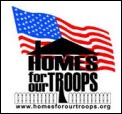
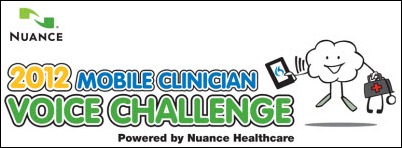
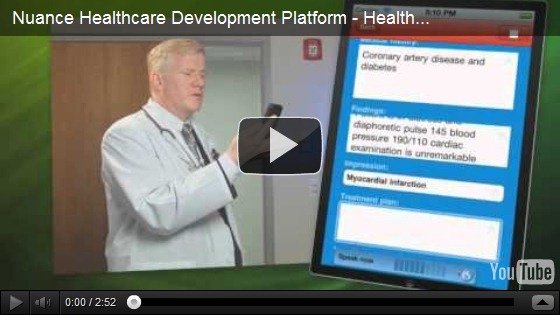
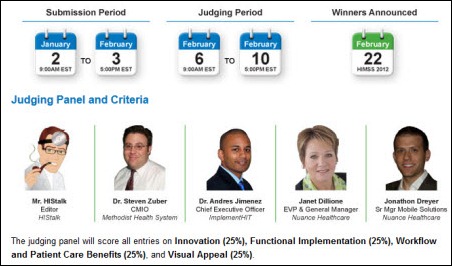
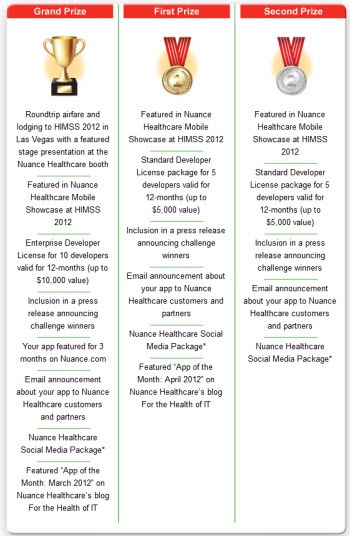

Neither of those sound like good news for Oracle Health. After the lofty proclamations of the last couple years. still…